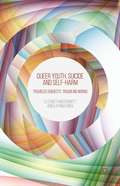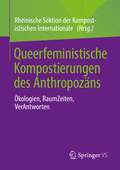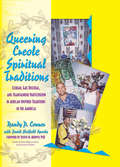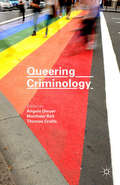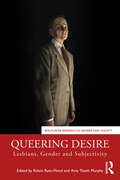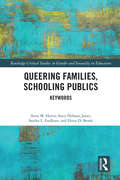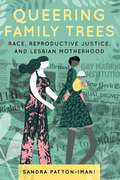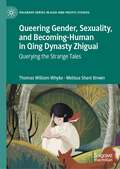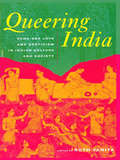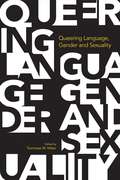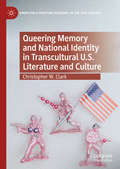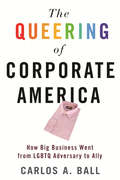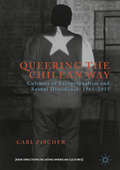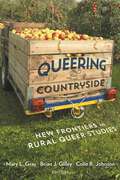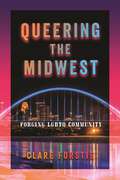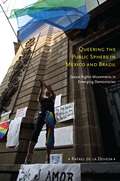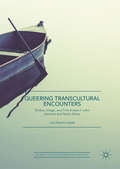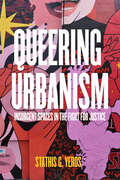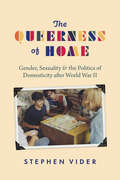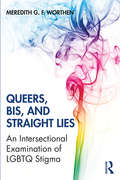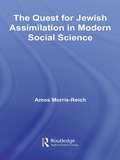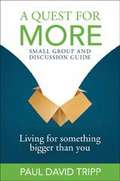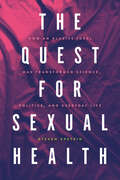- Table View
- List View
Queer Youth, Suicide and Self-Harm: Troubled Subjects, Troubling Norms
by Elizabeth McDermott Katrina RoenOffering a new way of understanding the high self-harm and suicide rates among sexual and gender minority youth, this book prioritises the perspectives and experiences of queer young people, including those who have experience of self-harming and/or feeling suicidal. Presenting analysis based on research carried out with young people both online and face-to-face, the authors offer a critical perspective on the role of norms, namely developmental norms, gender and sexuality norms, and neoliberal norms, in the production of self-harming and suicidal youth. Queer Youth, Suicide and Self-Harm is unique in the way it works at the intersection of class and sexuality, and in its specific focus on transgender youth and the concept of embodied distress. It also examines the implications of this research for self-harm reduction and suicide prevention.
Queerfeministische Kompostierungen des Anthropozäns: Ökologien, RaumZeiten, VerAntworten
by Rheinische Sektion der Kompostistischen InternationaleKompost ist zugleich eine Ontologie und eine Art und Weise des Wissens, der Wissensproduktion, die gemeinsam das vermeintlich Gegebene ‚der Welt‘ auseinanderdröseln, um daraus vielzählige Welten hervorzubringen. Alles ist und bedeutet gleichzeitig, ereignet, affiziert, transformiert sich: Wissen kompostiert Welt kompostiert Wissen. Kompost unterläuft Trennungen von Ästhetik, Ethik, Epistemologie und Ontologie, wie sie für das westliche Denken charakteristisch sind. Ausschließung, Einschließung, Gewalt, race, class, gender müssen kompostiert werden, müssen ver/antwortet, gehalten, anders gedacht und anders erzählt, Privilegien zersetzt und verlernt werden. Hierbei nehmen radikal nichtbinäre, pluriversale, relationale, queerfeministische Ökologien onto-epistemologische Gestalt an, die Relationalitäten, Responseabilities und Sorge sowie RaumZeiten und Materien/Materialisierungen verschränkt mit-denken, gerade ohne über sie zu verfügen.
Queering Bathrooms
by Sheila L. CavanaghThe intersection of public washrooms and gender has become increasingly politicized in recent years: queer and trans folk have been harassed for allegedly using the 'wrong' washroom, while widespread campaigns have advocated for more gender-neutral facilities. In Queering Bathrooms, Sheila L. Cavanagh explores how public toilets demarcate the masculine and the feminine and condition ideas of gender and sexuality.Based on 100 interviews with GLBT and/or intersex peoples in major North American cities, Cavanagh delves into the ways that queer and trans communities challenge the rigid gendering and heteronormative composition of public washrooms. Incorporating theories from queer studies, trans studies, psychoanalysis, and the work of Michel Foucault, Cavanagh argues that the cultural politics of excretion is intimately related to the regulation of gender and sexuality. Public toilets house the illicit and act as repositories for the social unconscious. Also offering suggestions for imagining a more inclusive public washroom, Queering Bathrooms asserts that although toilets are not typically considered within traditional scholarly bounds, they form a crucial part of our modern understanding of sex and gender.
Queering Creole Spiritual Traditions: Lesbian, Gay, Bisexual, and Transgender Participation in African-Inspired Traditions in the Americas
by David Sparks Randy P Lundschien ConnerWhat roles do queer and transgender people play in the African diasporic religions? Queering Creole Spiritual Traditions: Lesbian, Gay, Bisexual, and Transgender Participation in African-Inspired Traditions in the Americas is a groundbreaking scholarly exploration of this long-neglected subject. It offers clear insight into the complex dynamics of gender and sexual orientation, humans and deities, and race and ethnicity, within these richly nuanced spiritual practices. Queering Creole Spiritual Traditions explores the ways in which gender complexity and same-sex intimacy are integral to the primary beliefs and practices of these faiths. It begins with a comprehensive overview of Vodou, Santeria, and other African-based religions. The second section includes extensive, revealing interviews with practitioners who offer insight into the intersection of their beliefs, their sexual orientation, and their gender identity. Finally, it provides a powerful analysis of the ways these traditions have inspired artists, musicians, and writers such as Audre Lorde, as well as informative interviews with the artists themselves. In Queering Creole Spiritual Traditions, you will discover: how the presence of androgynous divinities affects both faith and practice in Vodou, Candomble, Santeria, and other Creole religions how the phenomenon of possession or embodiment by a god or goddess may validate queer identity and nurture gender complexity who practices the African-derived spiritual traditions, what they believe, and who their deities are how these faiths have influenced the art and aesthetic traditions of the West This landmark book opens a fascinating new world of thought and belief. The authors provide rigorous documentation and faultless scholarly method as well as personal experience and the testimony of believers. Queering Creole Spiritual Traditions sheds new light on two widely different fields: LGBT studies and the theology of the African diaspora. A thorough bibliography points the way to further study, and an extensive photograph gallery provides a unique look at the believers and their practices. Every library with holdings in queer theory, African mythology, or sociology of religion should have this landmark volume.
Queering Criminology: Dangerous Bedfellows? (Critical Criminological Perspectives Ser.)
by Angela Dwyer Matthew Ball Thomas CroftsQueer criminological work is at the forefront of critical academic criminology, responding to the exclusion of queer communities from criminology, and the injustices that they experience through the criminal justice system. This volume draws together both theoretical and empirical contributions that develop the growing scholarship being produced at the intersection of 'queer' and 'criminology'. Reflecting the diversity of research that is undertaken at this intersection, the contributions to this volume offer a deeper theoretical and conceptual development of this field alongside empirical research that illustrates the continued relevance and urgency of such scholarship. The contributions consider what it means to be queering criminology in the current political, social, and criminological climate, and chart directions along which this field might develop in order to ensure that greater social and criminal justice for LGBTIQ communities is achieved.
Queering Desire: Lesbians, Gender and Subjectivity (Routledge Research in Gender and Society)
by Róisín Ryan-Flood and Amy Tooth MurphyQueering Desire explores, with unprecedented interdisciplinary scope, contemporary configurations of lesbian, bi, queer women’s, and non-binary people’s experiences of identity and desire. Taking an intersectional feminist and trans-inclusive approach, and incorporating new and established identities such as non-binary, masculine of centre (MOC), butch, and femme, this collection examines how the changing landscape for gender and sexual identities impacts on queer culture in productive and transformative ways.Within queer studies, explorations of desire, longing, and eroticism have often neglected AFAB, transfeminine, and non-binary people’s experiences. Through 25 newly commissioned chapters, a diverse range of authors, from early career researchers to established scholars, stage conversations at the cutting edge of sexuality studies. Queering Desire advances our understanding of contemporary lesbian and queer desire from an inclusive perspective that is supportive of trans and non-binary identities.This innovative interdisciplinary collection is an excellent resource for scholars, undergraduate, and postgraduate students interested in gender, sexuality, and identity across a range of fields, such as queer studies, feminist theory, anthropology, media studies, sociology, psychology, history, and social theory. In foregrounding female and non-binary experiences, this book constitutes a timely intervention.
Queering Families, Schooling Publics: Keywords (Routledge Critical Studies in Gender and Sexuality in Education)
by Anne M. Harris Sandra L. Faulkner Stacy Holman Jones Eloise D. BrookAt a time of increasingly diverse and dynamic debates on the intersections of contemporary LGBTQ rights, trans* visibility, same-sex families, and sexualities education, there is surprisingly little writing on what it means to queer notions of family and kinship networks in global context. Building on the recent wave of scholarship on queerness in families and how families intersect with schools, schooling and educational institutions more broadly, this book considers how we are taught to enact family at home, at school and through the media, and how this pedagogy has shifted and changed over time. Conceived as a collection of keywords that take up the vocabulary of queerness, queering practices, and queer families, the authors employ a nuanced intersectional approach to connect the damaging and persistent invisibility of their subject to the complex and dominant and normalizing discourses of marriage and family. Offering post-structural, post-humanist, and new materialist perspectives on kinship and the family, this book moves the conversation forward by critically interrogating and expanding upon current knowledges about gender diversity, queer kinship, and pedagogy.
Queering Family Trees: Race, Reproductive Justice, and Lesbian Motherhood
by Sandra Patton-ImaniArgues that significant barriers to family-making exist for lesbian mothers of color in the United StatesOne might be tempted, in the afterglow of Obergefell v. Hodges, to believe that the battle has been won, that gays and lesbians fought a tough fight and finally achieved equality in the United States through access to legal marriage. But that narrative tells only one version of a very complex story about family and citizenship.Queering Family Trees explores the lived experience of queer mothers in the United States, drawing on over one hundred interviews with African American, Latina, Native American, white, and Asian American lesbian mothers living in a range of socioeconomic circumstances to show how they have navigated family-making. While the legalization of same-sex marriage and adoption in 2015 has provided avenues toward equality for some couples, structural and economic barriers have meant that others—especially queer women of color who often have fewer financial resources—have not been able to access seemingly available “choices” such as second-parent adoptions, powers of attorney, and wills. Sandra Patton-Imani here argues that the virtual exclusion of lesbians of color from public narratives about LGBTQ families is crucial to maintaining the narrative that legal marriage for same-sex couples provides access to full equality as citizens. Through the lens of reproductive justice, Patton-Imani argues that the federal legalization of same-sex marriage reinforces existing structures of inequality grounded in race, gender, sexuality, and class. Queering Family Trees explores the lives of a critically erased segment of the queer population, demonstrating that the seemingly “color blind” solutions offered by marriage equality do not rectify such inequalities.
Queering Gender, Sexuality, and Becoming-Human in Qing Dynasty Zhiguai: Querying the Strange Tales (Palgrave Series in Asia and Pacific Studies)
by Thomas William Whyke Melissa Shani BrownThis book offers queer readings of Chinese Qing Dynasty zhiguai, ‘strange tales’, a genre featuring supernatural characters and events. In a unique approach interweaving Chinese philosophies alongside critical theories, this book explores tales which speak to contemporary debates around identity and power. Depictions of porous boundaries between humans and animals, transformations between genders, diverse sexualities, and contextually unusual masculinities and femininities, lend such tales to queer readings. Unlike previous scholarship on characters as allegorical figures or stories as morality tales, this book draws on queer theory, animal studies, feminism, and Deleuzian philosophy, to explore the ‘strange’ and its potential for social critique. Examining such tales enriches the scope of historic queer world literatures, offering culturally situated stories of relationships, desires, and ways of being, that both speak to and challenge contemporary debates.
Queering India: Same-Sex Love and Eroticism in Indian Culture and Society
by Ruth VanitaQueering India is the first book to provide an understanding of same-sex love and eroticism in Indian culture and society. The essays focus on pre-colonial, colonial, and post-colonial gay and lesbian life in India to provide a comprehensive look at a much neglected topic. The topics are wide-ranging, considering film, literature, popular culture, historical and religious texts, law and other aspects of life in India. Specifically, the essays cover such issues as Deepa Mehta's recent and controversial film, Fire, which focused on lesbian relationships in India; the Indian penal code which outlaws homosexual acts; a case of same-sex love and murder in colonial India; homophobic fiction and homoerotic advertising in current day India; and lesbian subtext in Hindu scripture. All of the essays are original to the collection. Queering India promises to change the way we understand India as well as gay and lesbian life and sexuality around the world.
Queering Language: Gender and Sexuality
by Tommaso M. MilaniThis volume showcases ten years of research on language, gender and sexuality informed by queer theory. In line with a queer dislike for any normalizing discourse and practice, the book gives a multi-faceted set of applications of queer theoretical ideas to linguistic analysis.
Queering Memory and National Identity in Transcultural U.S. Literature and Culture (American Literature Readings in the 21st Century)
by Christopher W. ClarkThis book examines the queer implications of memory and nationhood in transcultural U.S. literature and culture. Through an analysis of art and photography responding to the U.S. domestic response to 9/11, Iraq war fiction, representations of Abu Ghraib and Guantánamo Bay, and migrant fiction in the twenty-first century, Christopher W. Clark creates a queer archive of transcultural U.S. texts as a way of destabilizing heteronormativity and thinking about productive spaces of queer world-building. Drawing on the fields of transcultural memory, queer studies, and transculturalism, this book raises important questions of queer bodies and subjecthood. Clark traces their legacies through texts by Sinan Antoon, Mohamedou Ould Slahi among others, alongside film and photography that includes artists such as Nina Berman and Hasan Elahi. In all, the book queers forms of cultural memory and national identity to uncover the traces of injury but also spaces of regeneration.
The Queering of Corporate America: How Big Business Went from LGBTQ Adversary to Ally
by Carlos A. BallAn accurate picture of the LGBTQ rights movement's achievements is incomplete without this surprising history of how corporate America joined the cause.Legal scholar Carlos Ball tells the overlooked story of how LGBTQ activism aimed at corporations since the Stonewall riots helped turn them from enterprises either indifferent to or openly hostile toward sexual minorities and transgender individuals into reliable and powerful allies of the movement for queer equality. As a result of street protests and boycotts during the 1970s, AIDS activism directed at pharmaceutical companies in the 1980s, and the push for corporate nondiscrimination policies and domestic partnership benefits in the 1990s, LGBTQ activism changed big business's understanding and treatment of the queer community. By the 2000s, corporations were frequently and vigorously promoting LGBTQ equality, both within their walls and in the public sphere. Large companies such as American Airlines, Apple, Google, Marriott, and Walmart have been crucial allies in promoting marriage equality and opposing anti-LGBTQ regulations such as transgender bathroom laws. At a time when the LGBTQ movement is facing considerable political backlash, The Queering of Corporate America complicates the narrative of corporate conservatism and provides insights into the future legal, political, and cultural implications of this unexpected relationship.
Queering the Chilean Way
by Carl FischerThis book examines and critiques the fact that Chile's claims to economic exceptionalism have been embodied, often quite aggressively, in a heterosexual, and primarily male, ideal. Despite the many shifts Chilean economics and politics have undergone over the past fifty years, the country's view of itself as a "model" in contrast to other Latin American countries has remained constant. By deploying an artistic, literary, and cinematic archive of queer figures from this period, this book draws parallels among the exceptionalisms of Chile's economic discourse, the subjects deemed most (and least) apt to embody it, and the maneuvers of its cultural production between local and global ideas of gender and politics to delineate its place in the world. Queering the Chilean Way thus sheds light on the sexual, economic, and aesthetic dimensions of exceptionalism--at its heart, a discourse of exclusion that often comprises a major element of nationalism--in Chile and throughout the Americas.
Queering the Countryside: New Frontiers in Rural Queer Studies (Intersections #11)
by Mary L. Gray Brian J. Gilley Colin R. JohnsonRural queer experience is often hidden or ignored, and presumed to be alienating, lacking, and incomplete without connections to a gay culture that exists in an urban elsewhere. Queering the Countryside offers the first comprehensive look at queer desires found in rural America from a genuinely multi-disciplinary perspective. This collection of original essays confronts the assumption that queer desires depend upon urban life for meaning. By considering rural queer life, the contributors challenge readers to explore queer experiences in ways that give greater context and texture to modern practices of identity formation. The book's focus on understudied rural spaces throws into relief the overemphasis of urban locations and structures in the current political and theoretical work on queer sexualities and genders. Queering the Countryside highlights the need to rethink notions of "the closet" and "coming out" and the characterizations of non-urban sexualities and genders as "isolated" and in need of "outreach." Contributors focus on a range of topics--some obvious, some delightfully unexpected--from the legacy of Matthew Shepard, to how heterosexuality is reproduced at the 4-H Club, to a look at sexual encounters at a truck stop, to a queer reading of TheWizard of Oz. A journey into an unexplored slice of life in rural America, Queering the Countryside offers a unique perspective on queer experience in the modern United States and Canada.
Queering the Midwest: Forging LGBTQ Community
by Clare ForstieHow LGBTQ community life in a small Midwestern city differs from that in larger cities with established gayborhoodsRiver City is a small, Midwestern, postindustrial city surrounded by green hills and farmland with a population of just over 50,000. Most River City residents are white, working-class Catholics, a demographic associated with conservative sexual politics. Yet LGBTQ residents of River City describe it as a progressive, welcoming, and safe space, with active LGBTQ youth groups and regular drag shows that test the capacity of bars.In this compelling examination of LGBTQ communities in seemingly “unfriendly” places, Queering the Midwest highlights the ambivalence of LGBTQ lives in the rural Midwest, where LGBTQ organizations and events occur occasionally but are generally not grounded in long-standing LGBTQ institutions. Drawing on in-depth interviews and ethnographic observation, Clare Forstie offers the story of a community that does not fit neatly into a narrative of progress or decline. Rather, this book reveals the contradictions of River City’s LGBTQ community, where people feel both safe and unnoticed, have a sense of belonging and persistent marginalization, and have friendships that do and don’t matter. These “ambivalent communities” in small Midwestern cities challenge the ways we think about LGBTQ communities and relationships and push us to embrace the contradictions, failures, and possibilities of LGBTQ communities across the American Midwest.
Queering the Public Sphere in Mexico and Brazil: Sexual Rights Movements in Emerging Democracies
by Rafael de la DehesaQueering the Public Sphere in Mexico and Brazil is a groundbreaking comparative analysis of the historical development and contemporary dynamics of LGBT activism in Latin America's two largest democracies. Rafael de la Dehesa focuses on the ways that LGBT activists have engaged with the state, particularly in alliance with political parties and through government health agencies in the wake of the AIDS crisis. He examines this engagement against the backdrop of the broader political transitions to democracy, the neoliberal transformation of state-civil society relations, and the gradual consolidation of sexual rights at the international level. His comparison highlights similarities between sexual rights movements in Mexico and Brazil, including a convergence on legislative priorities such as antidiscrimination laws and the legal recognition of same-sex couples. At the same time, de la Dehesa points to notable differences in the tactics deployed by activists and the coalitions brought to bear on the state. De la Dehesa studied the archives of activists, social-movement organizations, political parties, religious institutions, legislatures, and state agencies, and he interviewed hundreds of individuals, not only LGBT activists, but also feminists, AIDS and human-rights activists, party militants, journalists, academics, and state officials. He marshals his prodigious research to reveal the interplay between evolving representative institutions and LGBT activists' entry into the political public sphere in Latin America, offering a critical analysis of the possibilities opened by emerging democratic arrangements, as well as their limitations. At the same time, exploring activists' engagement with the international arena, he offers new insights into the diffusion and expression of transnational norms inscribing sexual rights within a broader project of liberal modernity. Queering the Public Sphere in Mexico and Brazil is a landmark examination of LGBT political mobilization.
Queering Transcultural Encounters: Bodies, Image, and Frenchness in Latin America and North Africa (Palgrave Studies in Globalization and Embodiment)
by Luis Navarro-AyalaIn a highly original and interdisciplinary work bridging French and Francophone studies, cultural studies, media studies, and gender and sexuality studies, Luis Navarro-Ayala examines the transnational queer body as a physical and symbolic entity intrinsically connected with space. Through a transcultural and intersectional approach to bodily representations, socioeconomic conditions, and postcolonial politics, Navarro-Ayala analyzes queerness and Frenchness in narratives from North Africa and Latin America, revealing that Frenchness is coded to represent a sexually deviant “Other.” France and Frenchness, in two distinct regions of the global South, have come to represent an imagined queer space enabling sexual exploration, even in social conditions that would have otherwise prevented queer agency.
Queering Urbanism: Insurgent Spaces in the Fight for Justice
by Stathis G. YerosA free ebook version of this title is available through Luminos, University of California Press’s Open Access publishing program. Visit www.luminosoa.org to learn more. Conflicts about space and access to resources have shaped queer histories from at least 1965 to the present. As spaces associated with middle-class homosexuality enter mainstream urbanity in the United States, cultural assimilation increasingly erases insurgent aspects of these social movements. This gentrification itself leads to queer displacement. Combining urban history, architectural critique, and queer and trans theories, Queering Urbanism traces these phenomena through the history of a network of sites in the San Francisco Bay Area. Within that urban landscape, Stathis Yeros investigates how queer people appropriated existing spaces, how they expressed their distinct identities through aesthetic forms, and why they mobilized the language of citizenship to shape place and secure space. Here the legacies of LGBTQ+ rights activism meet contemporary debates about the right to housing and urban life.
The Queerness of Home: Gender, Sexuality, and the Politics of Domesticity after World War II
by Stephen ViderVider uncovers how LGBTQ people reshaped domestic life in the postwar United States. From the Stonewall riots to the protests of ACT UP, histories of queer and trans politics have almost exclusively centered on public activism. In The Queerness of Home, Stephen Vider turns the focus inward, showing that the intimacy of domestic space has been equally crucial to the history of postwar LGBTQ life. Beginning in the 1940s, LGBTQ activists looked increasingly to the home as a site of connection, care, and cultural inclusion. They struggled against the conventions of marriage, challenged the gendered codes of everyday labor, reimagined domestic architecture, and contested the racial and class boundaries of kinship and belonging. Retelling LGBTQ history from the inside out, Vider reveals the surprising ways that the home became, and remains, a charged space in battles for social and economic justice, making it clear that LGBTQ people not only realized new forms of community and culture for themselves—they remade the possibilities of home life for everyone.
Queers, Bis, and Straight Lies: An Intersectional Examination of LGBTQ Stigma
by Meredith G. WorthenThough there have been great advances for LGBTQ people in recent years, stigma, intolerance, and prejudice remain. Queers, Bis, and Straight Lies: An Intersectional Examination of LGBTQ Stigma offers an in-depth exploration of LGBTQ negativity through its ground-breaking use of Norm-Centered Stigma Theory (NCST), the first ever theory about stigma that is both testable and well-positioned in existing stigma scholarship. Based on research with more than 3,000 respondents, hetero-cis-normativity and intersectionality are highlighted as fundamental in understanding separate but interconnected discussions about LGBTQ individuals’ experiences with discrimination, harassment, and violence. With chapters dedicated to lesbian women, gay men, bisexual women, bisexual men, trans women, trans men, non-binary/genderqueer people, queer women, and queer men, Queers, Bis, and Straight Lies brings together empirically-driven findings that work toward dismantling "straight lies" in an innovative and impactful manner. Through its novel and critical approach, Queers, Bis, and Straight Lies is the ideal resource for those who want to learn about LGBTQ stigma more broadly and for those who seek a nuanced, theory-driven, and intersectional examination of how LGBTQ prejudices and prejudicial experiences differ by gender identity, sexual identity, race/ethnicity, and class.
A Quest for Humanity
by Menno BoldtIn A Quest for Humanity, Menno Boldt presents a persuasive new framework for achieving a human social order in the global age. Boldt explores the concept of 'the good society' as a world in which every person can realize their potential for humanity through liberty, social justice, and equal human dignity.A Quest for Humanity innovatively positions globalization as a deterministic phenomenon of expanding interdependence and shared knowledge -- resulting in ever-larger economic and political jurisdictions, but also creating social and psychological links between peoples across the world. Boldt challenges mainstream certainty that Western democracy and constitutional human rights are the exemplary doctrines for the global good society. With a fresh vision designed to inspire a universal acknowledgement of human dignity, A Quest for Humanity powerfully affirms the value of each human being.
The Quest for Jewish Assimilation in Modern Social Science (Routledge Studies in Social and Political Thought #Vol. 54)
by Amos Morris-ReichThe transformation of the human sciences into the social sciences in the third part of the 19th century was closely related to attempts to develop and implement methods for dealing with social tensions and the rationalization of society. This book studies the connections between academic disciplines and notions of Jewish assimilation and integration and demonstrates that the quest for Jewish assimilation is linked to and built into the conceptual foundations of modern social science disciplines. Focusing on two influential "assimilated" Jewish authors—anthropologist Franz Boas and sociologist Georg Simmel—this study shows that epistemological considerations underlie the authors’ respective evaluations of the Jews’ assimilation in German and American societies as a form of "group extinction" or as a form of "social identity." This conceptual model gives a new "key" to understanding pivotal issues in recent Jewish history and in the history of the social sciences.
A Quest for More: Living for Something Bigger Than You
by Paul David Tripp Michael BreecePaul David Tripp expertly traverses the deepest recesses of the human heart and compassionately invites fellow Christian travelers to journey with him into God's bigger kingdom in this comprehensive personal and group study guide. Readers will appreciate and be challenged by the extensive and intuitive questions and comments that skillfully lead individuals through the text of A Quest for More while allowing for more in-depth interaction and introspection in both a personal and group setting. Whether used at home for personal study or offered as a church-wide series, this flexible guide will effectively meet the end goals of deeper biblical understanding and powerful life changes.
The Quest for Sexual Health: How an Elusive Ideal Has Transformed Science, Politics, and Everyday Life
by Steven EpsteinOffering an entryway into the distinctive worlds of sexual health and a window onto their spillover effects, sociologist Steven Epstein traces the development of the concept and parses the debates that swirl around it. Since the 1970s, health professionals, researchers, governments, advocacy groups, and commercial interests have invested in the pursuit of something called "sexual health." Under this expansive banner, a wide array of programs have been launched, organizations founded, initiatives funded, products sold—and yet, no book before this one asks: What does it mean to be sexually healthy? When did people conceive of a form of health called sexual health? And how did it become the gateway to addressing a host of social harms and the reimagining of private desires and public dreams? Conjoining "sexual" with "health" changes both terms: it alters how we conceive of sexuality and transforms what it means to be healthy, prompting new expectations of what medicine can provide. Yet the ideal of achieving sexual health remains elusive and open-ended, and the benefits and costs of promoting it are unevenly distributed across genders, races, and sexual identities. Rather than a thing apart, sexual health is intertwined with nearly every conceivable topical debate—from sexual dysfunction to sexual violence, from reproductive freedom to the practicalities of sexual contact in a pandemic. In this book Steven Epstein analyzes the rise, proliferation, uptake, and sprawling consequences of sexual health activities, offering critical tools to assess those consequences, expand capacities for collective decision making, and identify pathways that promote social justice.
